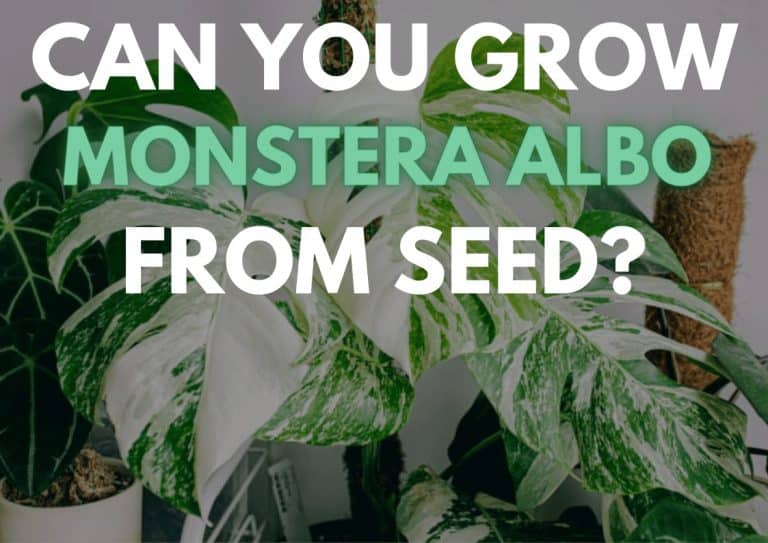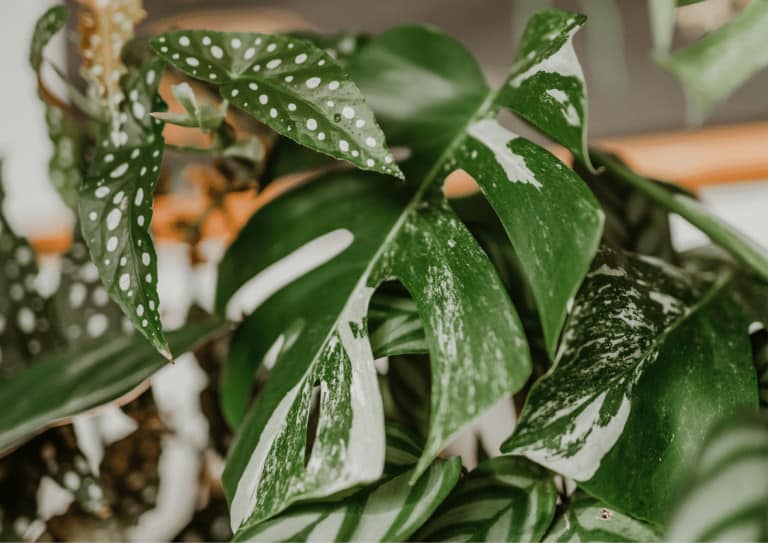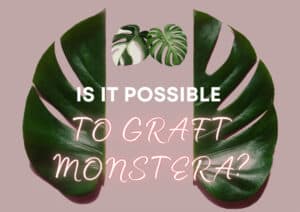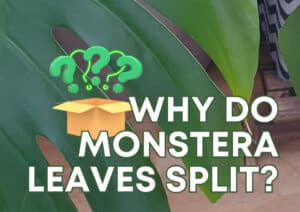Can You Grow Monstera Albo From Seed?
- Lakeisha Ethans
- February 12, 2022
If you buy something using the retail links in our articles, sometimes we earn a small affiliate commission. This does not impact the products we recommend.
The Monstera Albo is a unique and highly-prized plant that is a variegated version of the popular Monstera Deliciosa. Their white-splotched appearance is a result of a lack of chlorophyll, a sunlight-absorbing component, in the white areas. These aesthetically-pleasing patterns occur due to a natural genetic mutation of the Monstera Deliciosa.
It is technically possible to grow Monstera Albo from seeds, but the chances are minuscule. Variegation is caused by a recessive gene. There is no way to guarantee that any given Monstera seed will grow into a plant with variegation. As such, it is impossible to successfully propagate a guaranteed Monstera Albo from seeds.
Many people desire the Monstera Albo. Its expensive price and trendiness are due to its beauty and rarity. But it can be hard to reliably get your hands on these gorgeous plants, much less grow them yourself. In this article, we’ll give you the information you need on this complex topic.
Some of the things we’ll cover include:
- Do Monstera Albo houseplants produce seeds?
- Are variegated phenotypes of Monstera Albo stable enough for seed propagation?
- How do you propagate a Monstera Albo?
- Is variegation on a Monstera Albo stable once grown, and can it be further stabilized?
This post explores the nature of Monstera Albo and their variegation, how to propagate variegated Monstera plants, and what to expect from this mutation.

Does Monstera Albo produce seeds?
Plants produce seeds easily in their natural habitats, and the same goes for the Monstera Albo. In the wild, these seeds come from a fruit that they naturally produce. The fruits resemble cobs or pine cone-type structures.
With that being said, it is very rare for a Monstera Albo kept as a houseplant to produce its own seeds. These plants, when kept inside, are rarely exposed to the exact environmental requirements necessary to produce flowers, never mind have them pollinated in order to produce fruit and seeds.
You can attempt to mimic a “wild” environment so that your plant can produce fruit, but the chances are slim. Monstera infloresence are pollinated by insects, flys in particular, which are not always welcomed indoors.
So it is not impossible, but you will need to do a lot of experimenting to recreate the conditions that your Monstera Albo needs to bear fruit, and a lot of patience is necessary!
Are variegated phenotypes of Monstera Albo stable enough for seed propagation?
Because indoor Monstera Albo plants don’t usually produce seeds, you’ll usually need to buy fresh seeds if you want to grow them from scratch.
But will that ensure that you get a lovely variegated plant?
In reality, the variegated phenotypes of Monstera Albo cannot be reliably grown from seed. Even seeds taken from an adult variegated Monstera will be unlikely to mimic the parent’s appearance. The variegation comes from a rare recessive gene, so it’s reliant on more than just parentage. This is why Monstera Albo are so rare and prized.
This can be somewhat disappointing to learn, especially if you’ve spent some time online looking for seeds marketed as guaranteed Monstera Albo plants.
A lot of sellers take advantage of people’s lack of knowledge on the subject to essentially run a bit of a scam with this coveted product. The truth is that they can’t guarantee variegation from any seeds they sell!
It’s technically possible to grow variegated Monstera Albo from seed propagation, but the chances for success are extremely tiny. You may grow hundreds or thousands of normal Monstera before ever seeing a single variegated Albo.
Variegation may be pretty to us, but it’s considered a disadvantage from the plant’s perspective. White spots are a sign of a lack of chlorophyll. The genetic mutation from this recessive gene essentially makes it harder for the plant to absorb sunlight and survive, so, naturally, most Monstera will grow without such patterns.
Our Favorite Monstera Plants And Supplies On Etsy
How do you propagate a Monstera Albo?
We’ve established that you can’t reliably grow new Monstera Albo plants from seeds, and buying fully grown plants is feasible but very expensive, so you’ll likely want to find a way to propagate this variegated flora from a cutting.
The best way to propagate a Monstera Albo plant is through stem cuttings. You can purchase a cutting online or cut from an already grown plant that you own. These cuttings can then be rooted in either water, moss or even grafted onto a mature Monstera deliciosa.
To root a Monstera Albo in water, wait until your plant’s main roots have begun to branch, creating smaller sub-roots that are several inches in length. Better roots will increase the survivability of your plant. Use filtered water (or rain water) and apply a rooting hormone or similar product to encourage improved development of roots.
You’ll need to keep a water-propagated Monstera Albo in a bright, warm location. Do note that this can be a risky way to propagate, as transferring the plant to soil later on will be a bit of a shock to it. If you’re a first-time propagator, opt for moss instead.
To root a Monstera Albo in moss, create a mix of perlite and sphagnum moss. You can apply a rooting hormone or some worm castings to provide extra nutrients. This type of moss is good for encouraging strong roots and can allow for easier transference to soil later on. You’ll want to keep the humidity high and the moss moist without being wet for best results.
Wet sticks or small Monstera Albo sticks without foliage, can also be propagated in the same moss mixture. Give the plant time to root by placing the node face-down on the moss. Once a full leaf has unfurled, you can transplant the Monstera Albo to the soil as usual.
It is important to keep in mind that even stem cuttings don't provide you with a 100% guarantee of variegation. You'll have a much better chance with these cuttings than through seeds, and it's highly likely to work, but it's not a guaranteed result.

Is variegation on a Monstera Albo stable once grown, and can it be further stabilized?
Unfortunately, Monstera Albo plants don’t have stable variegation, even after the plant has grown. This is because of the naturally occurring variability in the variegation mutation.
This means that a plant with beautifully white-speckled leaves can eventually end up with plain green vegetation. This “reverting” is an understandable fear for many owners of these plants. The good news is that you can help to promote future variegation in your Monstera Albo with a few carefully taken steps.
To begin with, you have to be willing to trim the leaves from your Monstera Albo. Yes, it can be a bit painful to think of doing so, but it’s necessary!
Whenever your Monstera Albo grows a completely green or almost completely green leaf, trim the leaf off. This can help to prevent the pattern of unstable variegation from intensifying.
You also have to do this for completely white leaves. They’re certainly beautiful and are definitely worth taking a lot of photos of, but they don’t have any chlorophyll in them at all. This means they’re unable to absorb sunlight and will, ultimately, end up dying quickly anyway.
Before totally white leaves die, your plant will struggle to support the leaf. Meanwhile, the leaf will be unable to contribute anything in return to the rest of the plant. This holds back healthy future growth, so trimming these pure white leaves, while difficult, is necessary.
Take home message
It’s not possible to guarantee the successful growth of Monstera Albo from a seed. In fact, the rarity of such success makes this an unfeasible method of propagation for most plant owners. The recessive gene responsible for rare variegation can’t be predicted and has low chances of being passed down from parent plants.
If you want to propagate Monstera Albo successfully, you’ll have much better luck with stem cuttings in water or moss. Ensuring that you do all you can to keep the variegation stable will increase your chances of being able to maintain the plant’s patterned appearance.

Lakeisha Ethans
Houseplant Writer
Mother to two humans and hundreds of plant babies. Lakeisha uses her 15 years of experience as a content writer to specialise in simplifying what you need to know to grow and care for all indoor plants.
Similar Posts
Is It Possible To Graft Monstera? (Aroid Propagation)
Variegated Monstera plants are rare to come by naturally and cost heaps to buy fully grown. So is it possible to graft a low cost cutting onto a non-variegated plant instead?
Solving The Puzzle Of Why Monstera Leaves Split
Monstera plants are known for their beautiful split leaves, but why do their leaves develop this unique signature feature in the first place?



